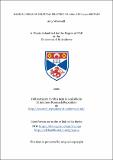Files in this item
Radical ideas of political practice in 1780s and 1790s Britain
Item metadata
| dc.contributor.advisor | Whatmore, Richard | |
| dc.contributor.author | Westwell, Amy | |
| dc.coverage.spatial | 8, 222 p. | en_US |
| dc.date.accessioned | 2022-03-09T15:18:24Z | |
| dc.date.available | 2022-03-09T15:18:24Z | |
| dc.date.issued | 2020-12-02 | |
| dc.identifier.uri | https://hdl.handle.net/10023/25015 | |
| dc.description.abstract | This thesis examines ideas about political tactics in 1780s and 1790s Britain. Edmund Burke characterised radicals in the aftermath of the French Revolution as speculative thinkers with no understanding of political action. This rhetorical strategy obscured the ideas of reformers who were frustrated with the rationalist bent of their movement and who, inspired by Scottish philosophy and events in Ireland, tried to work out what was to be done. James Mackintosh and Samuel Parr responded to Burke by arguing that theory could apply to practice, while David Williams outlined how political theory could direct reformers to the means to harness the general will and enact it through the sovereign. Interest in arming the people led David Steuart Erskine, Robert Watson, and John Cartwright to invoke the ideas of Andrew Fletcher. This interest in a militia was not purely theoretical; in Ireland from 1778 the Volunteers used a combination of arms and sumptuary rules to win legislative and trading rights. Francis Dobbs, Joseph Pollock and Henry Flood examined this movement to learn about political tactics. Lord George Gordon advocated for Francis Dobbs in the House of Commons and was imprisoned for his attempts to derail the Anglo-French Commercial Treaty, an issue that once again brought together Irish politics and discussions of commerce and luxury. In the 1790s, United Irishmen linked their understanding of the anti-luxury practice of the Volunteers with knowledge of the constitution they had learned from John Millar at Glasgow University. Meanwhile, Lord Buchan was using an unlikely tactic, the practice of history, to stir the Scots to pay attention to their Buchananite heritage. The tactical thought of British radicals in the 1790s was rarely concerned with discussions of the rights of man, but instead referred to ideas of arms, kings, commerce, and history. | en_US |
| dc.language.iso | en | en_US |
| dc.publisher | University of St Andrews | |
| dc.title | Radical ideas of political practice in 1780s and 1790s Britain | en_US |
| dc.type | Thesis | en_US |
| dc.contributor.sponsor | Scottish Graduate School for Arts and Humanities (SGSAH) | en_US |
| dc.type.qualificationlevel | Doctoral | en_US |
| dc.type.qualificationname | PhD Doctor of Philosophy | en_US |
| dc.publisher.institution | The University of St Andrews | en_US |
| dc.identifier.doi | https://doi.org/10.17630/sta/159 |
This item appears in the following Collection(s)
Items in the St Andrews Research Repository are protected by copyright, with all rights reserved, unless otherwise indicated.

